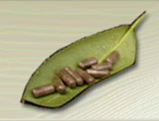 Loading... Please wait...
Loading... Please wait...Co2 Full Spectrum Holistic Herbs
Timing of Administration of Herbs
Posted by From: Ayurvedic Herbology East and West, A Practical Guide to Ayurvedic Herbal Medicine, written by: Vishnu Dass on 26th Dec 2013
In Ayurvedic herbology, the timing of administration of a medicine is another important factor to consider, as it may enhance its effects. Herbs that are taken before meals work more on the colon, kidneys, and reproductive organs, and play a key role in supporting the functions of apana vayu, the downward moving aspect of vata that governs elimination of waste products and menstruation. Herbs with mild laxative, diuretic, and emmenagogue properties also act on the lower half of the body, and can be taken before food to strengthen their action.
Herbs taken along with food act directly upon the stomach, spleen, liver, and small intestine. They support samana vayu, the aspect of vata governing digestive functions, as well as jathara agni and pachaka pitta, the main fires of digestion in the stomach and small intestine. Herbs acting on the middle part of the body are carminatives, stimulants, bitters, and nutritive tonics. Herbs taken after meals work on the upper portion of the body and directly affect prana, udana, and vyana vayus, giving them a stronger action on the lungs, heart, brain, and nervous system. Below is a list of times of administration and therapeutic effect they enhance.
Anannkala: Empty Stomach
Herbs taken first thing in the morning, then allowing as much time as possible (1-3 hours) before taking food, help to increase agni and burn ama and plegm. This is a good time to enhance various properties such as lekaniya (scraping of fat). This is the ideal time to give purgatives, emetics, or rasayanas (rejuvenating substances).
Pragbhukta: Before Meals
Herbs taken at this time are carried quickly to the pelvic region and have the greatest effect on the folon and apana vayu. This is one of the best times for treating chronic indigestion, gas, bloating, abdominal discomfort, and constipation, as well as disorders of the reproductive organs and urinary tract.
Madhyabhukta: During Meals
Herbs taken along with food act on samana vayu, the aspects of vata governing digestive functions in the area of the duodenum and small intestine. This is helpful for kindling the agni, improving peristalisis, absorption, and assimilation. It is also an easier way of taking herbs for those who have difficulty swallowing them or tolerating their taste.
Abhobhukta: Right After Meals
Herbs taken just after food work on the upper portion of the body and directly affect prana vayu, the aspect of vata governing respiration and the nervous system. They also help to restore the function of udana, the vayu responsible for speech, effort, energy, willpower, and memory, as well as that of vyana vayu, which is centered in the heart, moves throughout the body, and governs circulation. Digestive herbs can also be take at this time to treat slow sluggish digestion and help to strengthen and regulate the thyroid gland. People that are sensitive to herbs sometimes prefer to take herbs after meals. This seems to be a convenient time for people to remember to take their herbs, but proper timing should be encouraged whenever possible.
Antarabhukta: Between Meals
The seven bodily tissues receive their nourishment during this time (3 to 4 hours after a meal). Herbs taken at this time travel along with ahara rasa (nutrient precursors) to each of the dhatus, increasing metabolic activity.
Muhur Muhur: Frequent Administration
This can be as frequent as moment to moment or every few minutes. This method helps to send a constant reminder to the body. It is used for acute disorders of prana vayu like hiccup, burping, asthma, cough, and other respiratory disorders. Good examples of this are sipping on teas every 5-10 minutes, or licking certain pastes made from herbs and substances like honey to relieve acute symptoms. Another example is the use of spice blends for digestion (digestive churnas), which can be sprinkled on food and ingested every few minutes with each bite.
Swapnakala: Before Bedtime
Herbs given at bedtime or one hour before sleep help to redirect the movement of vata (vata anuloman). This is a good time to give laxatives or purgatives, and is also an ideal time for treating insomnia and other sleep disorders. Herbs taken at midnight can help with nightmares and disorders of maija dhatu (nerve tissues and marrow).
Sandhyakale: At Sunrise and Sunset
Herbs taken during this time act directly on the joints. Mild laxatives can also be taken at sunrise. Herbs that raise the consciousness, such as brahmi and vacha, can be taken in the early morning to promote good meditation.
For more tips and info visit our website at www.tattvasherbs.com















